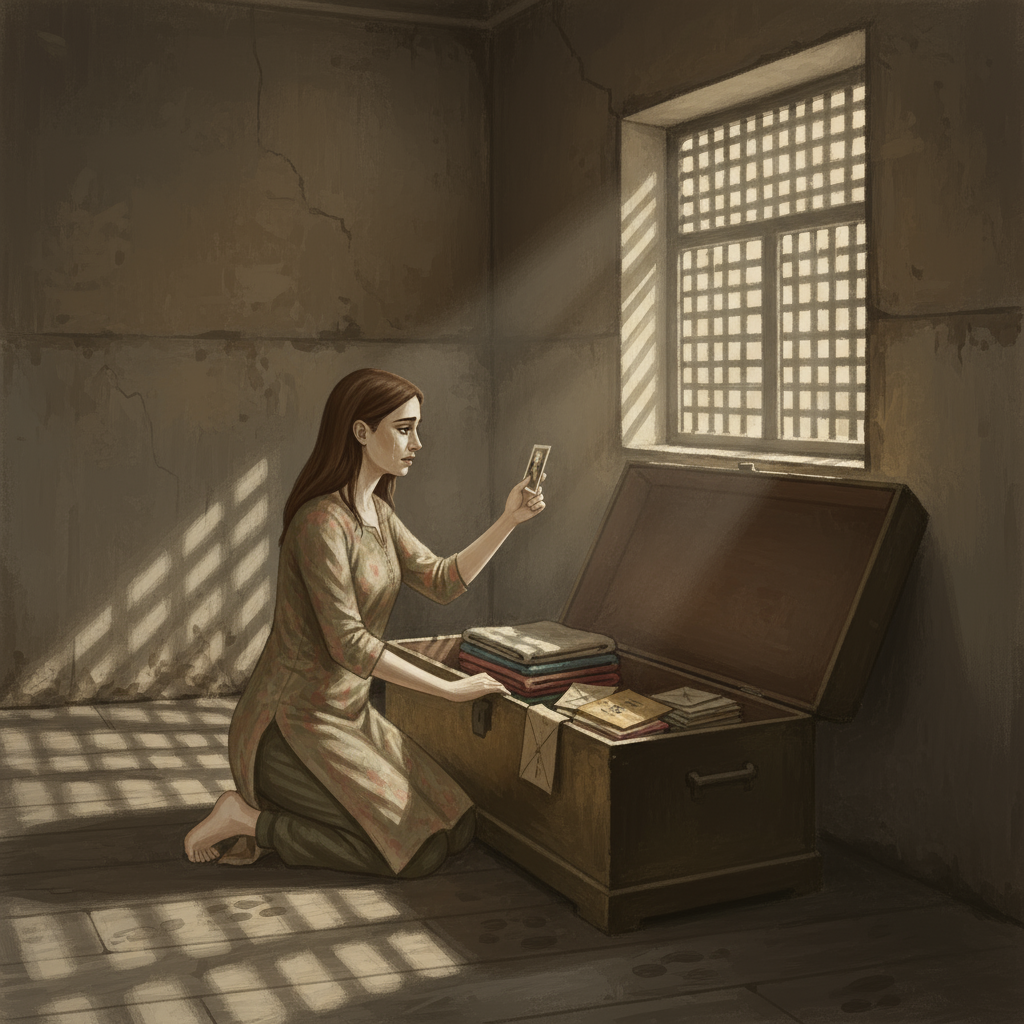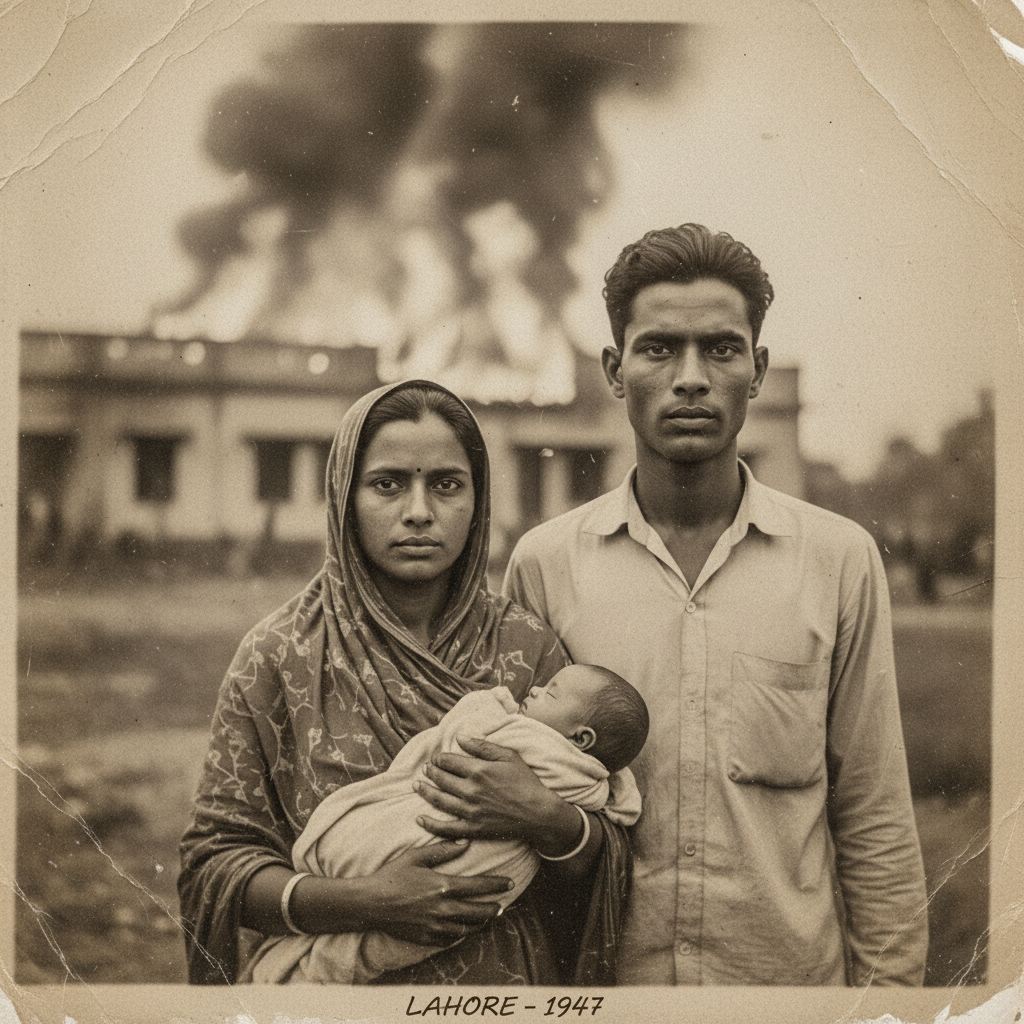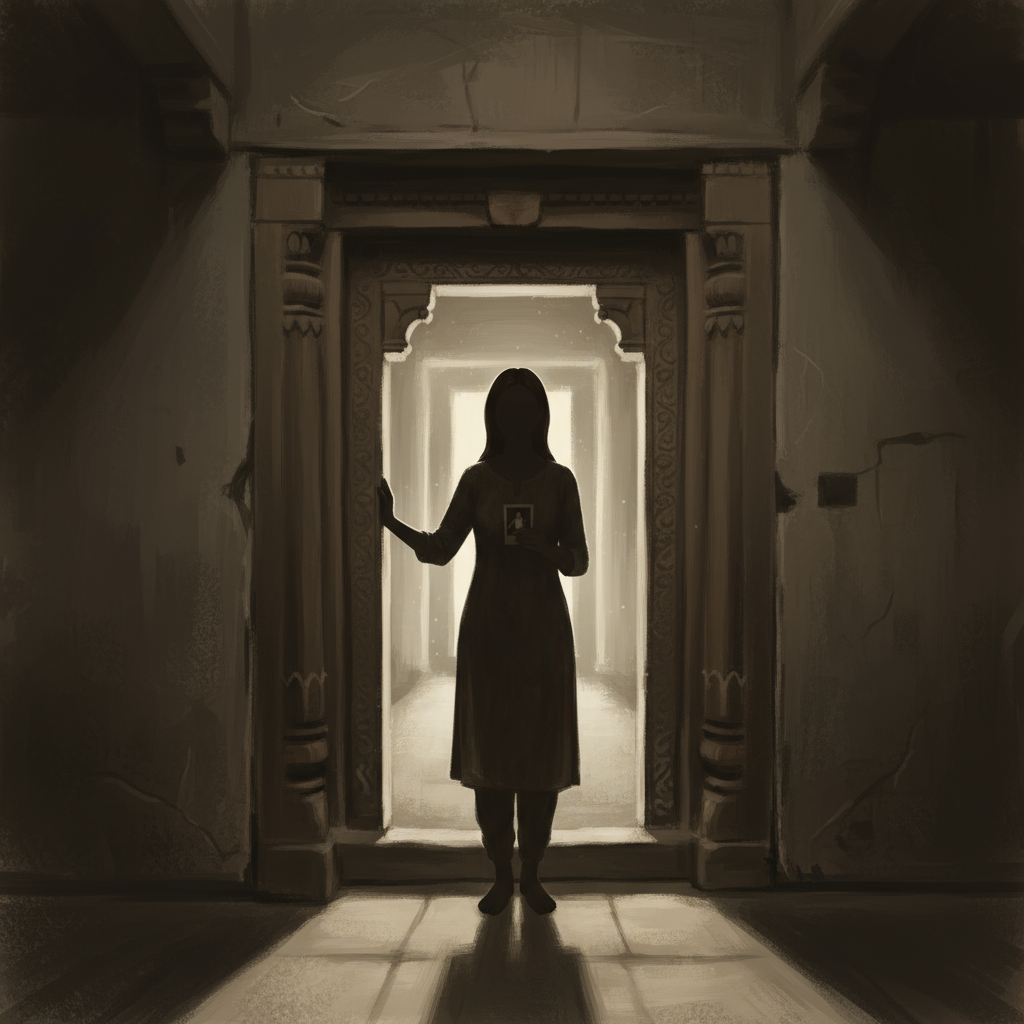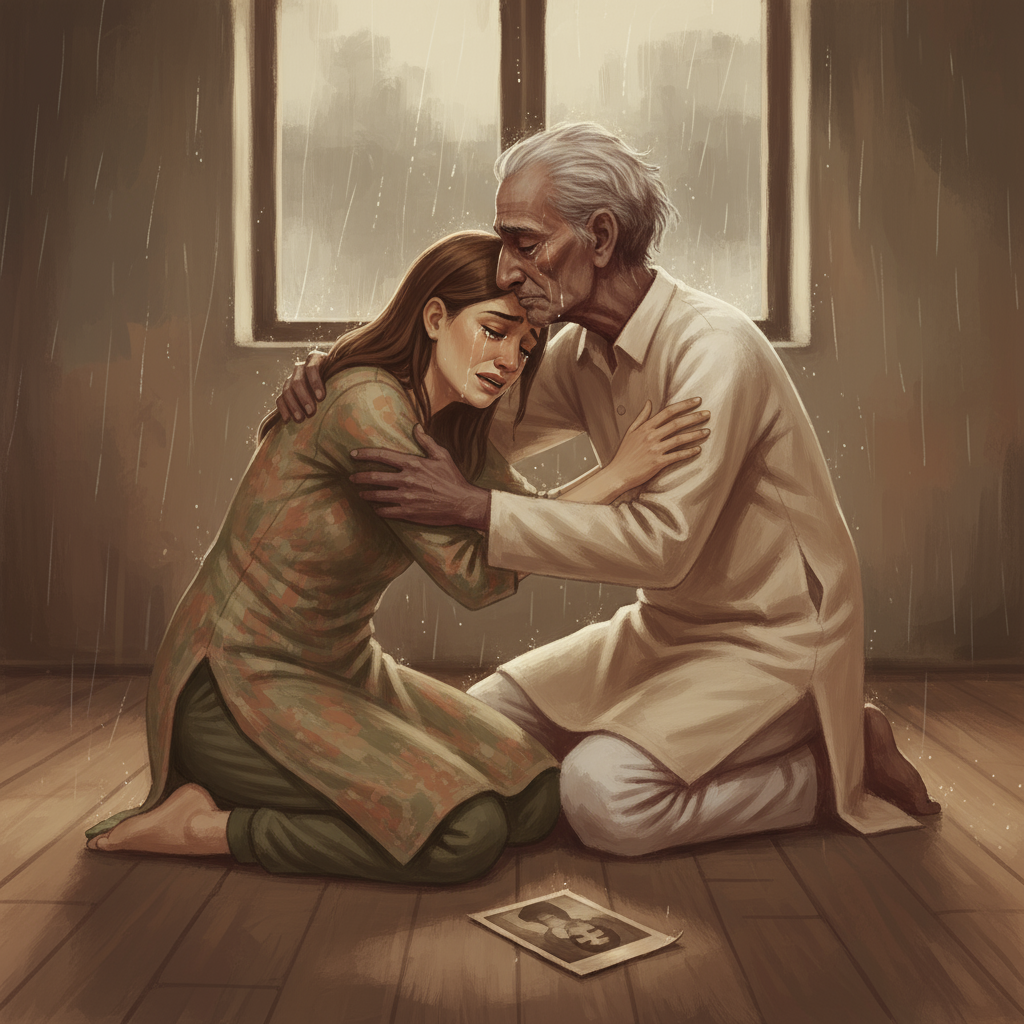The Partition's Child
Narrated by Thomas (AI voice) • Duration: ~10 minutes
Download MP3The brass trunk exhaled cardamom and grief when Meera lifted the lid. Three weeks since her mother's cremation, and the house still held Zainab's scent—jasmine oil worked into wood, turmeric staining kitchen tiles, sandalwood smoke threaded through fabric. In the next room, her father coughed, a wet sound that meant the monsoon would break soon. The air hung thick enough to drink.
She'd been methodical until now. Saris distributed to cousins. Jewelry catalogued for absent daughters. Letters tied with string, unread—her parents' privacy surviving them. But at the trunk's bottom, beneath the careful layers of a life, the photograph waited.

August 1947. Her mother's handwriting, precise despite faded ink. And below it: God forgive us.
Her parents, impossibly young, stood before a structure that might have been a church, or might have been a church burning. Hard to tell through the smoke. Her mother held an infant—pale skin stark against chaos, a torn dress that looked expensive, American. Her father's face, turned slightly from the camera, carried an expression Meera had never seen in three decades: fear.
This was not the story she knew.
She moved to the window, held the photograph to gray light. The ceiling fan squeaked overhead—forgive us, forgive us, forgive us. Outside, the first rumble of thunder. Inside, her father's footsteps, then silence. He stood now in the next room. She felt his stillness through the wall.
The dress—that was the detail. White eyelet lace, hand-stitched, the kind a missionary's wife might have made for her only child. Torn at the shoulder. Blood—or shadow?—darkening one sleeve. And her mother's arms, wrapped so tightly around the infant that her knuckles showed white even in the photograph's sepia grain.

Meera had always known she was adopted. Her pale skin and green eyes made that inescapable in Old Delhi's close streets. But the story had been simple: American missionaries killed in an accident, proper adoption through church channels, gratitude and love. Not this. Not August 1947—the month the subcontinent tore itself in half, when trains arrived full of corpses, when neighbors became butchers, when a million died for being born wrong.
Fragments surfaced now, the ones she'd dismissed as childish misunderstanding. Her father's nightmares, thrashing awake with Punjabi words she didn't know but recognized as violence. Her mother's absolute silence about years before 1948, as if history began with Meera's arrival. The way they both flinched at trains. The way they never spoke of Partition except to say they'd been lucky.
Lucky.
The photograph's edges were soft from handling. Someone—her mother—had held this often, thumb crossing those faces, that burning building, the plea for forgiveness. Kept but hidden. Looked but never showed. Carried the weight alone, or nearly alone, for thirty years.
What had her father said at the funeral? "Your mother was the bravest person I ever knew." She'd thought he meant the illness, the way Zainab had faced dying with such determined grace. But now—
Thunder approached. Air pressure dropped, squeezing. Meera's cotton kurta stuck to her back, sweat and humidity erasing boundaries. She could walk into the next room. She could ask. Her father was old now, small in a way that shocked her. The Parkinson's tremor had started this year—early stages, but advancing. Time was not infinite. Truth might die with him.
But what if the truth was that they'd killed her parents? What if this photograph showed not rescue but theft? What if the love she'd known was penance, guilt masquerading as devotion? What if she was a monster's child?
She pressed her forehead to the window frame. Outside, the first drops of rain began, sporadic percussion on courtyard stones. The smell of water on hot earth, that particular petrichor meaning relief, release, the breaking of something held too long.

"Meera?"
Her father's voice, rough from coughing. She turned. He stood in the doorway, backlit by dim light from the main room. His hand on the doorframe for balance, the tremor visible even at this distance. He saw the photograph.
His face broke.
Not guilt. Not fear. Something else—a wall collapsing, a dam breaching, thirty years of held breath finally released. He moved into the room, each step careful, and sat on the floor beside her. Held out his hand. She gave him the photograph.
"I've looked at this," he said in Hindi, "every year on your birthday. Trying to remember exactly how it felt."
"Tell me."
"Your mother—" His voice caught. Started again. "We were leaving Delhi. Hindu and Muslim, you understand. Married two years, trying to survive. We had papers saying we were cousins traveling together, but papers meant nothing then. Everything was burning."
The rain increased, drumming harder.
"The mission compound was on our route north. Already destroyed when we arrived. Bodies in the courtyard. We should have kept walking. Everyone said keep walking, don't stop, don't look, survive. But we heard crying."
He touched the infant in the photograph, his finger obscuring Meera's infant face.
"You were in your mother's arms. Both of them dead—your American mother and father. Killed trying to protect the Christian converts sheltering there. Killed by the same men hunting Muslim families. Who would have killed Zainab if they'd found us. You were screaming. Covered in blood that wasn't yours. Still alive because your mother's body had hidden you."
Meera couldn't breathe. The rain was a wall of sound.
"We took you. Wrapped you in Zainab's dupatta. Carried you through two hundred kilometers of hell. Your pale skin—do you understand? We had to hide you constantly. Anyone could have seen you as evidence we'd stolen a child, killed a family. We could have been murdered a hundred times over for saving you."
His hands shook worse, the photograph fluttering.
"Your mother wrote that a month later, when we finally felt safe enough to take your picture. She wrote it because we couldn't save the others. Because we survived when millions didn't. Because she loved you so much it terrified her—she'd lost her entire family to the violence, and here was this child, this impossible gift pulled from the burning. She asked forgiveness for living. For being happy."
He looked at her directly, his eyes wet.
"We loved you before we knew your name. We loved you when loving you was dangerous. We loved you because you were ours the moment we heard you cry."
Outside, the monsoon unleashed itself completely. Water sheeted off the roof, turned the courtyard to lake, beat the city into submission. Inside, Meera understood she'd feared the wrong thing. Not violence—love. Not that her parents had been monsters, but that love could emerge from such darkness and still be real. That the worst moment of history had produced her family. That truth was more complicated than she'd known, and more beautiful.
She crossed the small space and wrapped her arms around her father's thin shoulders. He smelled like old cotton and Dettol soap and thirty years of devotion. She felt his body shake with sobs held since 1947.
"I'm here, Abba," she said in Hindi. "I'm here."

The photograph lay between them on the floor, no longer hidden. Her mother and father, impossibly young, saving something from the inferno. Her three parents. Her two histories. All of it true, all of it hers.
The rain kept falling. The trunk stood open. The past was not simple, but it was no longer secret. And in the small room in Old Delhi, where the living held the dead close and the dead released the living, Meera understood: she was the partition's child, split from one family and grafted to another, but whole. Finally, impossibly, whole.